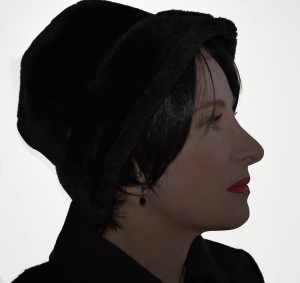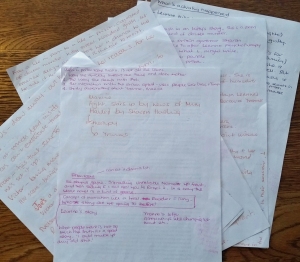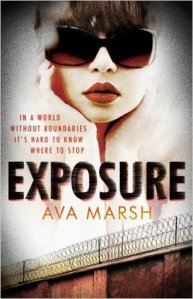I’m pleased to be able to welcome crime writer, Ava Marsh to the blog to talk about her first draft process. In April, I read her thrilling debut, Untouchable and you can find out what I thought about that, Here.
 Ava grew up in Margate, Kent. A former broadsheet journalist, she gave it up to work in the charity sector and write dark and rather risqué thrillers. She now resides in Battersea, London, and spends her spare time running, kayaking, and hanging out in cyberspace.
Ava grew up in Margate, Kent. A former broadsheet journalist, she gave it up to work in the charity sector and write dark and rather risqué thrillers. She now resides in Battersea, London, and spends her spare time running, kayaking, and hanging out in cyberspace.
Her first novel, Untouchable, was published in May 2015. Her second, Exposure, is out June 16th, 2016.
When you decide to write something new, what is the first thing you do?
I make notes on scraps of paper as ideas bubble up. I then mislay the notes and panic, imagining I’ve lost jewels of pure genius that I’ll never recover. At some point I’ll find the notes and realise my ideas were actually pretty banal, but I might eventually be able to work them up into something readable.
Do you have a set routine approaching it?
Over the years, I’ve formulated ways of getting my unconscious to give up the goods. Or is it my subconscious? I always get the two confused. I’ve compiled various sets of questions I use to force myself to think things through in some detail. I also like to draw diagrams on bits of paper with lines linking them together, which then confuse me further.
Pen and paper or straight to the keyboard?
 Pen and paper in the very early days, but as soon as I’m at a stage where I need to think in terms of scenes and chapters, I use Scrivener to set them up. I love how easily you can swap them around, as well as jot down bits of dialogue, location ideas and so on in an adjacent screen.
Pen and paper in the very early days, but as soon as I’m at a stage where I need to think in terms of scenes and chapters, I use Scrivener to set them up. I love how easily you can swap them around, as well as jot down bits of dialogue, location ideas and so on in an adjacent screen.
How important is research to you?
I view it as a necessary evil.
How do you go about researching?
I read books – for my forthcoming novel, Exposure, I read seven or eight biographies of porn stars, and every article on the industry I could find on the web. If I’ve a query or question about something specific, I just Google it. I am a very lazy researcher.
How do you store everything; ideas, research, images that catch your eye?
In computer files, that tend to proliferate across my laptop like weeds. Every now and then I round them up and try and get them in some kind of order.
Tell us how that first draft takes shape?
From the initial jotting-things-down ideas stage, I use Scrivener to divide my plot plan into chapters, starting with the most important scenes and others I’m sure about, then filling the gaps in between. When I’ve populated each chapter with notes and bits of research, perhaps a few dialogue exchanges, I have enough to start writing.
I do the very first draft on Scrivener, but as soon as there’s something resembling a complete document, I import it into Word. I’ve never managed to work out how to stop Scriv coming up with rather ‘creative’ ideas for indents and formatting and so on, which drives me a bit mad. Word is a devil I know.
Are there any rituals you have to do or items you must have with you while writing that draft?
Sometimes if I’m very anxious or very bored – my brain’s response to hard work is usually to rebel – I set a digital timer to make myself do at least 30 minutes without wandering back onto Facebook.
Does the outside world exist or are you lost to us for a period of time as the magic works?
Mostly I find getting that first draft down as painful as having teeth pulled. I hate how arbitrary everything feels, how much effort it takes to actually invent things. But when I reach the last third of the book and the characters feel more real and less like something I’ve just made up, I tend to get a second wind. Especially when I have a clearer idea of how it’s all going to end. I once wrote 11,000 words in an afternoon; by the evening my hands were aching from all that typing.
What does your work space look like?
 Most of the time, it’s a bloody mess. I tend only to clean and tidy between drafts and edits. It’s the same story with admin: it all collects until I’ve come to the end of whatever stage of the book I’m engaged in. When I realise the bailiffs are about to knock on my door for non-payment of some or other bill.
Most of the time, it’s a bloody mess. I tend only to clean and tidy between drafts and edits. It’s the same story with admin: it all collects until I’ve come to the end of whatever stage of the book I’m engaged in. When I realise the bailiffs are about to knock on my door for non-payment of some or other bill.
Edit as you go or just keep getting words out?
Keep getting the words out. I don’t see the point in polishing a turd. I tend not to worry about style until I’m reasonably sure whatever I’ve written is going to stay.
I see many writers counting words in a day. Word counter or other method of keeping track of progression?
I glance at the word count now and then, but I don’t sweat it. Some parts of the first draft are harder than others – your mileage can vary.
I tend to underwrite, so often I consciously have to try and up the word count by adding in more detail, description and so on.
So, that first draft is down. Roughly how long did it take? And what shape is it in?
I seem programmed to produce books that are around 50 chapters long, and try as I might, I simply cannot persuade myself to write more than a chapter a day. So a very first draft will take a couple of months, with a week or so of planning and brainstorming at the beginning.
I usually have something I’m prepared to show my agent or editor within six months. By that stage, it’s been through several incarnations: the initial draft, a second to address all the problems and plot holes the first one unearthed, then a third to tidy up the style and fill in any gaps.
In what format do you like to read it through, ereader, paper or the computer screen?
In the later stages, I’ll send it to Kindle, as that tricks the eye into seeing it differently. I never print out a manuscript I’m working on. I can’t be arsed, and I worry about the profligate use of paper.
What happens now that first draft is done?
I send it off, and try to distract myself while I wait for the dreaded verdict. The most effective way of doing that is to work on something else; it’s tricky to write and worry at the same time. Wine helps too.
You can find Ava on her Website, Twitter and Amazon.
Exposure
 Kitty Sweet isn’t like anyone you’ve ever met before.
Kitty Sweet isn’t like anyone you’ve ever met before.
She’s an infamous porn star, imprisoned for double murder. As damaged as she is charismatic, as dangerous as she is charming.
But once no different from you or I.
Kitty’s past is full of heartbreak and desperation, of adulation and glamour. Of ruin. She’s descended to an underworld most people can only imagine, and lived to tell the tale . . .
This is her story.
You can read more First Draft Q&As HERE. If you’re interested in taking part, please get in touch.

Ha, ha, ha, I can identify with the workspace! I used to be nearly OCD about a tidy workspace and knowing where everything was, but since having to share my office with the family papers and other fun objects, it’s got out of control!
Also interesting the comment about not printing out – very different from most people I have heard.
Thank you, as always, Rebecca and Ava, for an interesting peek behind the scenes!
LikeLiked by 1 person
Really enjoyed reading this. Untouchable was one of my top reads of 2015 so I was very excited to get a sneak peek into Exposure. Thanks Rebecca and Ava! 🙂
LikeLiked by 1 person
It’s always so helpful to learn how other authors set about that first draft. Thanks, both! Nice to know, too, that I’m not the only one who sometimes needs to go back and add in more ‘flesh’ to my stories. Wishing you much success!
LikeLiked by 1 person
Great review. Love the workspace. It definitely looks like a busy creative writer.
LikeLike